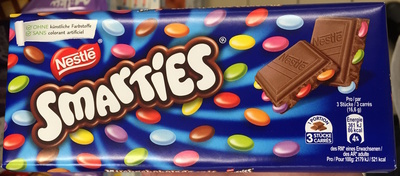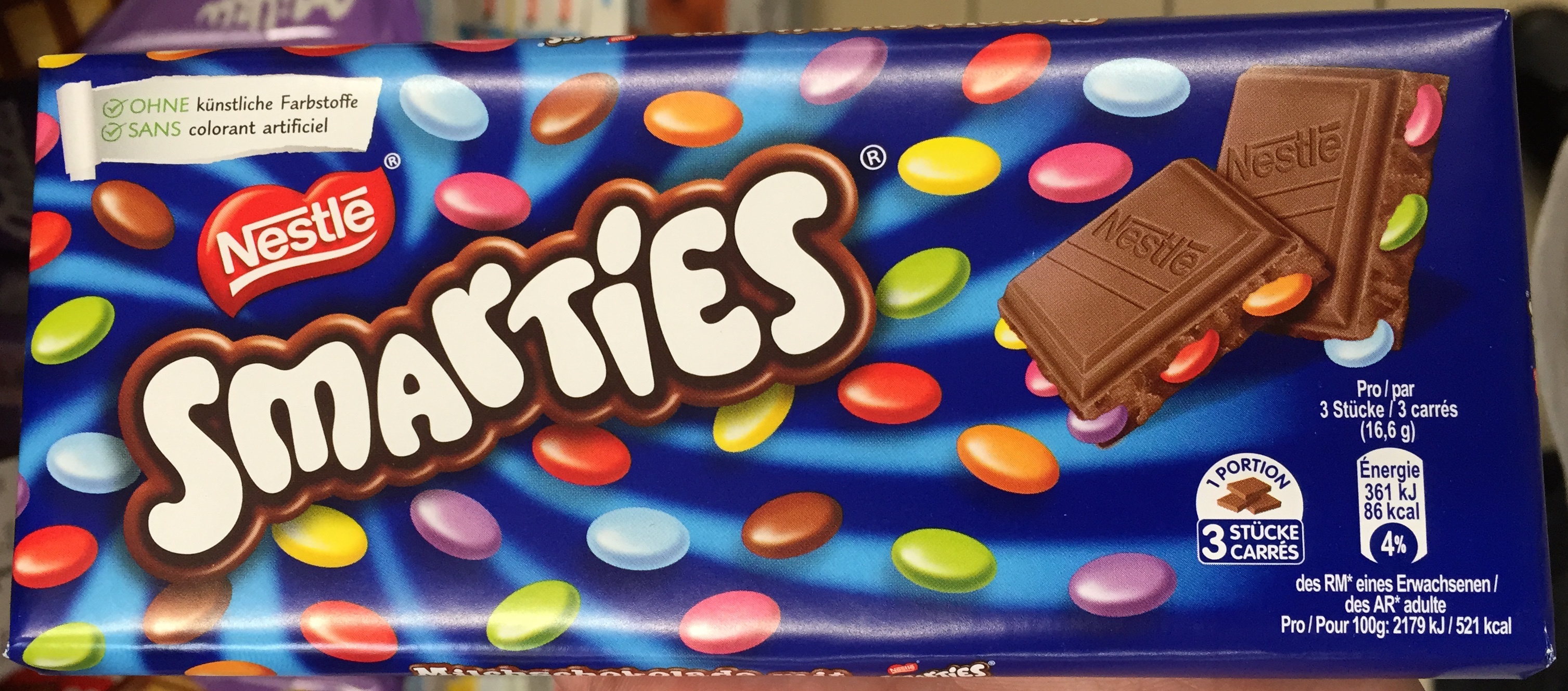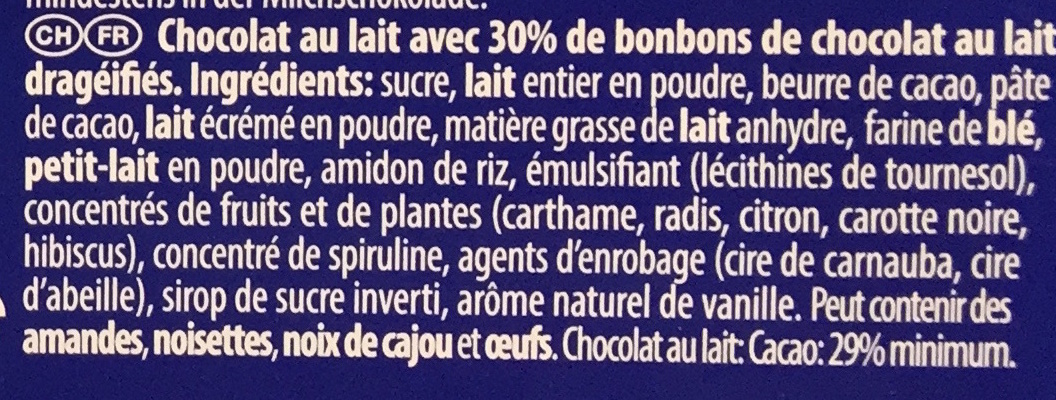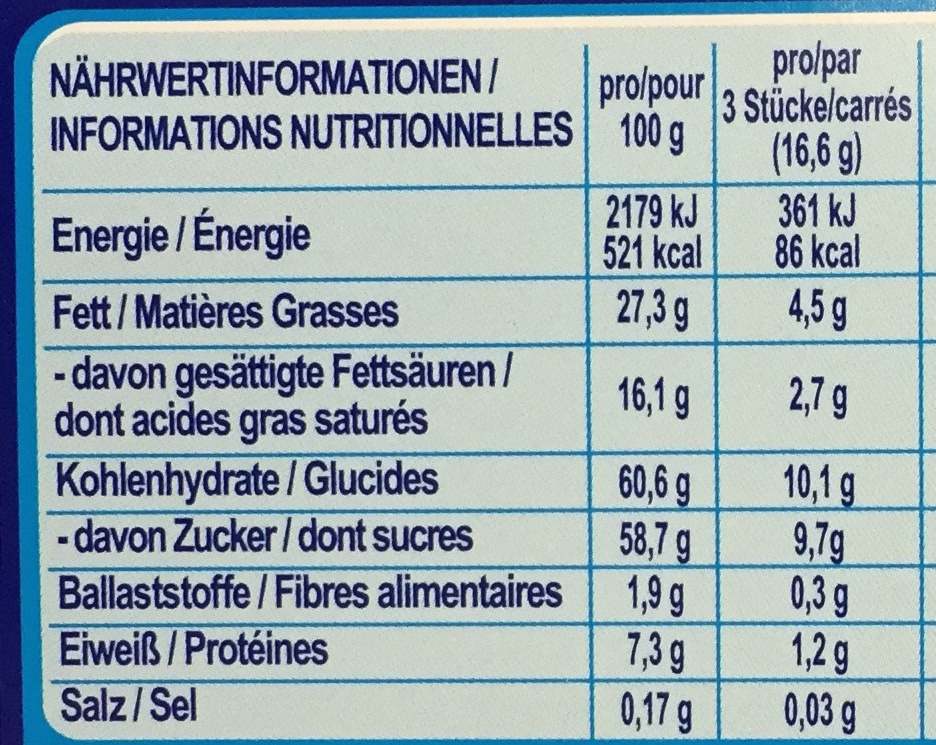Help us make food transparency the norm!
As a non-profit organization, we depend on your donations to continue informing consumers around the world about what they eat.
The food revolution starts with you!
Smarties - Nestlé - 100 g
Smarties - Nestlé - 100 g
This product page is not complete. You can help to complete it by editing it and adding more data from the photos we have, or by taking more photos using the app for Android or iPhone/iPad. Thank you!
×
Barcode: 7613035078581 (EAN / EAN-13)
Common name: Chocolat au lait avec 30% de bonbons de chocolat au lait dragéifiés
Quantity: 100 g
Packaging: Metal, Paper, Recyclable Metals, Aluminium
Brands: Nestlé
Categories: Snacks, Sweet snacks, Cocoa and its products, Confectioneries, Chocolate candies, Bonbons, Chocolates, Milk chocolates, fr:Bonbons dragéifiés
Labels, certifications, awards: Nestlé Cocoa Plan, No artificial colors
Manufacturing or processing places: Suisse
Stores: Carrefour Market, Magasins U
Countries where sold: France, Switzerland
Matching with your preferences
Health
Ingredients
-
23 ingredients
: Sucre, lait entier en poudre, beurre de cacao, pâte de cacao, lait écrémé en poudre, matière grasse de lait anhydre, farine de blé, petit-lait en poudre, amidon de riz, émulsifiant (lécithines de tournesol), concentrés de fruits et de plantes (carthame, radis, citron, carotte noire, hibiscus), concentré de spiruline, agents d'enrobage (cire de carnauba, cire d'abeille), sirop de sucre inverti, arôme naturel de vanille.Allergens: Gluten, MilkTraces: Eggs, Nuts
Food processing
-
Ultra processed foods
Elements that indicate the product is in the 4 - Ultra processed food and drink products group:
- Additive: E322 - Lecithins
- Additive: E901 - White and yellow beeswax
- Additive: E903 - Carnauba wax
- Ingredient: Emulsifier
- Ingredient: Flavouring
- Ingredient: Glazing agent
- Ingredient: Invert sugar
- Ingredient: Whey
Food products are classified into 4 groups according to their degree of processing:
- Unprocessed or minimally processed foods
- Processed culinary ingredients
- Processed foods
- Ultra processed foods
The determination of the group is based on the category of the product and on the ingredients it contains.
Additives
-
E322 - Lecithins
Lecithins are natural compounds commonly used in the food industry as emulsifiers and stabilizers.
Extracted from sources like soybeans and eggs, lecithins consist of phospholipids that enhance the mixing of oil and water, ensuring smooth textures in various products like chocolates, dressings, and baked goods.
They do not present any known health risks.
-
E322i - Lecithin
Lecithins are natural compounds commonly used in the food industry as emulsifiers and stabilizers.
Extracted from sources like soybeans and eggs, lecithins consist of phospholipids that enhance the mixing of oil and water, ensuring smooth textures in various products like chocolates, dressings, and baked goods.
They do not present any known health risks.
-
E901 - White and yellow beeswax
Beeswax: Beeswax -cera alba- is a natural wax produced by honey bees of the genus Apis. The wax is formed into "scales" by eight wax-producing glands in the abdominal segments of worker bees, which discard it in or at the hive. The hive workers collect and use it to form cells for honey storage and larval and pupal protection within the beehive. Chemically, beeswax consists mainly of esters of fatty acids and various long-chain alcohols. Beeswax has long-standing applications in human food and flavoring. For example, it is used as a glazing agent or as a light/heat source. It is edible, in the sense of having similar negligible toxicity to plant waxes, and is approved for food use in most countries and the European Union under the E number E901. However, the wax monoesters in beeswax are poorly hydrolysed in the guts of humans and other mammals, so they have insignificant nutritional value. Some birds, such as honeyguides, can digest beeswax. Beeswax is the main diet of wax moth larvae.Source: Wikipedia
-
E903 - Carnauba wax
Carnauba wax: Carnauba -; Portuguese: carnaúba [kaʁnɐˈubɐ]-, also called Brazil wax and palm wax, is a wax of the leaves of the palm Copernicia prunifera -Synonym: Copernicia cerifera-, a plant native to and grown only in the northeastern Brazilian states of Piauí, Ceará, Maranhão, Bahia, and Rio Grande do Norte. It is known as "queen of waxes" and in its pure state, usually comes in the form of hard yellow-brown flakes. It is obtained from the leaves of the carnauba palm by collecting and drying them, beating them to loosen the wax, then refining and bleaching the wax.Source: Wikipedia
Ingredients analysis
-
Palm oil free
No ingredients containing palm oil detected
-
Non-vegan
Non-vegan ingredients: Whole milk powder, Skimmed milk powder, Whey powder, E901
-
Vegetarian status unknown
Unrecognized ingredients: fr:Matière grasse de lait anhydre
-
Details of the analysis of the ingredients
: Sucre, _lait_ entier en poudre, beurre de cacao, pâte de cacao, _lait_ écrémé en poudre, matière grasse de _lait_ anhydre, farine de _blé_, _petit-lait_ en poudre, amidon de riz, émulsifiant (lécithines de tournesol), concentrés de fruits et (carthame, radis, citron, carotte noire, hibiscus), concentré de spiruline, agents d'enrobage (cire de carnauba, cire d'abeille), sirop de sucre inverti, arôme naturel de vanille- Sucre -> en:sugar - vegan: yes - vegetarian: yes - ciqual_proxy_food_code: 31016 - percent_min: 6.66666666666667 - percent_max: 100
- _lait_ entier en poudre -> en:whole-milk-powder - vegan: no - vegetarian: yes - ciqual_food_code: 19021 - percent_min: 0 - percent_max: 50
- beurre de cacao -> en:cocoa-butter - vegan: yes - vegetarian: yes - ciqual_food_code: 16030 - percent_min: 0 - percent_max: 33.3333333333333
- pâte de cacao -> en:cocoa-paste - vegan: yes - vegetarian: yes - ciqual_proxy_food_code: 16030 - percent_min: 0 - percent_max: 25
- _lait_ écrémé en poudre -> en:skimmed-milk-powder - vegan: no - vegetarian: yes - ciqual_food_code: 19054 - percent_min: 0 - percent_max: 20
- matière grasse de _lait_ anhydre -> fr:matiere-grasse-de-lait-anhydre - percent_min: 0 - percent_max: 16.6666666666667
- farine de _blé_ -> en:wheat-flour - vegan: yes - vegetarian: yes - ciqual_proxy_food_code: 9410 - percent_min: 0 - percent_max: 14.2857142857143
- _petit-lait_ en poudre -> en:whey-powder - vegan: no - vegetarian: maybe - percent_min: 0 - percent_max: 12.5
- amidon de riz -> en:rice-starch - vegan: yes - vegetarian: yes - ciqual_proxy_food_code: 9510 - percent_min: 0 - percent_max: 11.1111111111111
- émulsifiant -> en:emulsifier - percent_min: 0 - percent_max: 10
- lécithines de tournesol -> en:sunflower-lecithin - vegan: yes - vegetarian: yes - percent_min: 0 - percent_max: 10
- concentrés de fruits et -> en:fruit-concentrate - labels: en:vegan - vegan: en:yes - vegetarian: en:yes - percent_min: 0 - percent_max: 9.09090909090909
- carthame -> en:safflower - vegan: yes - vegetarian: yes - percent_min: 0 - percent_max: 9.09090909090909
- radis -> en:radish - vegan: yes - vegetarian: yes - ciqual_food_code: 20045 - percent_min: 0 - percent_max: 4.54545454545455
- citron -> en:lemon - vegan: yes - vegetarian: yes - ciqual_proxy_food_code: 13009 - percent_min: 0 - percent_max: 3.03030303030303
- carotte noire -> en:black-carrot - vegan: yes - vegetarian: yes - ciqual_food_code: 20009 - percent_min: 0 - percent_max: 2.27272727272727
- hibiscus -> en:roselle-flower - vegan: yes - vegetarian: yes - percent_min: 0 - percent_max: 1.81818181818182
- concentré de spiruline -> en:spirulina-concentrate - vegan: yes - vegetarian: yes - ciqual_proxy_food_code: 20984 - percent_min: 0 - percent_max: 8.33333333333333
- agents d'enrobage -> en:glazing-agent - percent_min: 0 - percent_max: 7.69230769230769
- cire de carnauba -> en:e903 - vegan: yes - vegetarian: yes - percent_min: 0 - percent_max: 7.69230769230769
- cire d'abeille -> en:e901 - vegan: no - vegetarian: yes - percent_min: 0 - percent_max: 3.84615384615385
- sirop de sucre inverti -> en:invert-sugar-syrup - vegan: yes - vegetarian: yes - percent_min: 0 - percent_max: 7.14285714285714
- arôme naturel de vanille -> en:natural-vanilla-flavouring - vegan: yes - vegetarian: yes - percent_min: 0 - percent_max: 5
Nutrition
-
Bad nutritional quality
⚠ ️Warning: the amount of fruits, vegetables and nuts is not specified on the label, it was estimated from the list of ingredients: 0This product is not considered a beverage for the calculation of the Nutri-Score.
Positive points: 1
- Proteins: 4 / 5 (value: 7, rounded value: 7)
- Fiber: 1 / 5 (value: 1, rounded value: 1)
- Fruits, vegetables, nuts, and colza/walnut/olive oils: 0 / 5 (value: 0.0683593749999929, rounded value: 0.1)
Negative points: 26
- Energy: 6 / 10 (value: 2179, rounded value: 2179)
- Sugars: 10 / 10 (value: 58, rounded value: 58)
- Saturated fat: 10 / 10 (value: 16, rounded value: 16)
- Sodium: 0 / 10 (value: 0, rounded value: 0)
The points for proteins are not counted because the negative points are greater or equal to 11.
Nutritional score: (26 - 1)
Nutri-Score:
-
Nutrient levels
-
Fat in high quantity (27%)
What you need to know- A high consumption of fat, especially saturated fats, can raise cholesterol, which increases the risk of heart diseases.
Recommendation: Limit the consumption of fat and saturated fat- Choose products with lower fat and saturated fat content.
-
Saturated fat in high quantity (16%)
What you need to know- A high consumption of fat, especially saturated fats, can raise cholesterol, which increases the risk of heart diseases.
Recommendation: Limit the consumption of fat and saturated fat- Choose products with lower fat and saturated fat content.
-
Sugars in high quantity (58%)
What you need to know- A high consumption of sugar can cause weight gain and tooth decay. It also augments the risk of type 2 diabetes and cardio-vascular diseases.
Recommendation: Limit the consumption of sugar and sugary drinks- Sugary drinks (such as sodas, fruit beverages, and fruit juices and nectars) should be limited as much as possible (no more than 1 glass a day).
- Choose products with lower sugar content and reduce the consumption of products with added sugars.
-
Salt in low quantity (0%)
What you need to know- A high consumption of salt (or sodium) can cause raised blood pressure, which can increase the risk of heart disease and stroke.
- Many people who have high blood pressure do not know it, as there are often no symptoms.
- Most people consume too much salt (on average 9 to 12 grams per day), around twice the recommended maximum level of intake.
Recommendation: Limit the consumption of salt and salted food- Reduce the quantity of salt used when cooking, and don't salt again at the table.
- Limit the consumption of salty snacks and choose products with lower salt content.
-
-
Nutrition facts
Nutrition facts As sold
for 100 g / 100 mlAs sold
per serving (16,6 g)Compared to: fr:Bonbons dragéifiés Energy 2,179 kj
(521 kcal)362 kj
(87 kcal)+23% Fat 27 g 4.48 g +133% Saturated fat 16 g 2.66 g +148% Carbohydrates 60 g 9.96 g -22% Sugars 58 g 9.63 g +2% Fiber 1 g 0.166 g +16% Proteins 7 g 1.16 g +129% Salt 0 g 0 g -100% Fruits‚ vegetables‚ nuts and rapeseed‚ walnut and olive oils (estimate from ingredients list analysis) 0.068 % 0.068 %
Environment
-
Eco-Score D - High environmental impact
⚠ ️Select a country in order to include the full impact of transportation.The Eco-Score is an experimental score that summarizes the environmental impacts of food products.→ The Eco-Score was initially developped for France and it is being extended to other European countries. The Eco-Score formula is subject to change as it is regularly improved to make it more precise and better suited to each country.Life cycle analysis
-
Average impact of products of the same category: D (Score: 38/100)
Category: Milk chocolate bar
Category: Milk chocolate bar
- PEF environmental score: 0.78 (the lower the score, the lower the impact)
- including impact on climate change: 12.74 kg CO2 eq/kg of product
Stage Impact Agriculture
43.5 %Processing
50.8 %Packaging
1.3 %Transportation
3.7 %Distribution
0.6 %Consumption
0.0 %
Bonuses and maluses
-
Missing origins of ingredients information
Malus: -5
⚠ ️ The origins of the ingredients of this product are not indicated.
If they are indicated on the packaging, you can modify the product sheet and add them.
If you are the manufacturer of this product, you can send us the information with our free platform for producers.
-
Packaging with a low impact
Malus: -4
Shape Material Recycling Impact Unknown Heavy aluminium Recycle Medium Unknown Paper Low ⚠ ️ The information about the packaging of this product is not sufficiently precise (exact shapes and materials of all components of the packaging).⚠ ️ For a more precise calculation of the Eco-Score, you can modify the product page and add them.
If you are the manufacturer of this product, you can send us the information with our free platform for producers.
Eco-Score for this product
-
Impact for this product: D (Score: 29/100)
Product: Smarties - Nestlé - 100 g
Life cycle analysis score: 38
Sum of bonuses and maluses: -9
Final score: 29/100
-
Carbon footprint
-
Equal to driving 6.6 km in a petrol car
1274 g CO² per 100g of product
The carbon emission figure comes from ADEME's Agribalyse database, for the category: Milk chocolate bar (Source: ADEME Agribalyse Database)
Stage Impact Agriculture
31.2 %Processing
65.4 %Packaging
0.8 %Transportation
2.4 %Distribution
0.1 %Consumption
0.0 %
Packaging
-
Packaging with a low impact
-
Packaging parts
(Aluminium)
(Paper)
-
Packaging materials
Material % Packaging weight Packaging weight per 100 g of product Paper or cardboard Metal Total
-
Transportation
-
Origins of ingredients
Missing origins of ingredients information
⚠ ️ The origins of the ingredients of this product are not indicated.
If they are indicated on the packaging, you can modify the product sheet and add them.
If you are the manufacturer of this product, you can send us the information with our free platform for producers.Add the origins of ingredients for this product Add the origins of ingredients for this product
Report a problem
-
Incomplete or incorrect information?
Category, labels, ingredients, allergens, nutritional information, photos etc.
If the information does not match the information on the packaging, please complete or correct it. Open Food Facts is a collaborative database, and every contribution is useful for all.
Data sources
Product added on by tacite
Last edit of product page on by packbot.
Product page also edited by desan, foodrepo, magasins-u.










